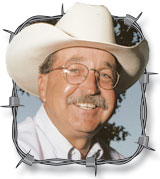Cattle theft has been a problem for as long as cattle have been domesticated. The severity of the problem comes and goes with the fluctuating prices of livestock. Right now, it’s as bad as I’ve ever seen it and, considering the current high prices of beef cattle, I guess we shouldn’t be surprised.
In the 1800s, the thieves were relatively easy to catch. Since the stolen property had to be rounded up on horseback and driven, on foot, to a holding pen or market, a good tracker could follow the signs and catch up with the bad guys – barring hoof prints being washed away by rain or dust storms. Once caught, justice was swift and permanent with only a body left hanging from a low-lying limb of an oak tree to serve as carrion for the vultures and other varmints.
You see, to steal someone’s cattle is to steal that farmer’s reason for living. The typical beef farmer spends the entire year feeding, tending and doctoring the animals in hopes of reaching that one (maybe two, if they calve in both spring and fall) payday that allows them to carry on their way of life for another 12 months. They do their work in all kinds of weather, every day (and night) of the week, to try to make enough money to keep doing the job they love. When someone disrupts their chances for a profit, they take it VERY seriously.
In my part of the country, the thieves seem to be very sophisticated and savvy. Of course, with today’s technology, anyone with access to the Internet can pull up very clear and detailed satellite images of where my cattle are located and how many fences they’ll have to cut through to reach the pen or corral that they see on their high-definition computer screen. Still, they have to know the timing and terrain well enough to pull off their crime in the dark of night without alerting anyone. I’m amazed at how well they have been able to do it.
Visiting with a group of friends at the stockyards a couple of weeks ago, our conversation soon turned to the rustling problem and what each of us would do, should we come upon someone attempting to steal our cattle.
The first rancher, a mild-mannered gentleman in his 50s, stated that he’d call 911 on his cell phone and wait until the sheriff arrived. A crusty, old-timer in the group asked, “And what would you do if they took off while you were waiting for the law?”
The first gentleman replied, “I guess I’d take off after them while still on the phone with the sheriff’s office.”
“Not me,” the old man replied angrily, “I’d drive in with guns blazing and let the Good Lord sort it out when the dust settled.”
Another friend, who has actually had some cattle stolen during this past year, said he would hold them at gunpoint until help arrived, but he’d sure give them a cussing while they waited and, if one of them even moved, he would be more than happy to, “Blow their heads off!”
The last one of our groups’ cattlemen said he would just want some time alone with them. “So you could beat the tar out of them?” asked the crusty, old rancher.
“Nope,” he replied calmly, “I just want to learn how they got so good at handling strange cattle – in strange conditions – in the absolute dark of nighttime. I can’t even catch my own cattle in the daytime when conditions are perfect!”
Jerry Crownover is a farmer and former professor of Agriculture Education at Missouri State University. He is a native of Baxter County, Arkansas, and an author and professional speaker. To contact Jerry about his books, or to arrange speaking engagements, you may contact him by calling 1-866-532-1960 or visiting ozarksfn.com and clicking on ‘Contact Us.’







